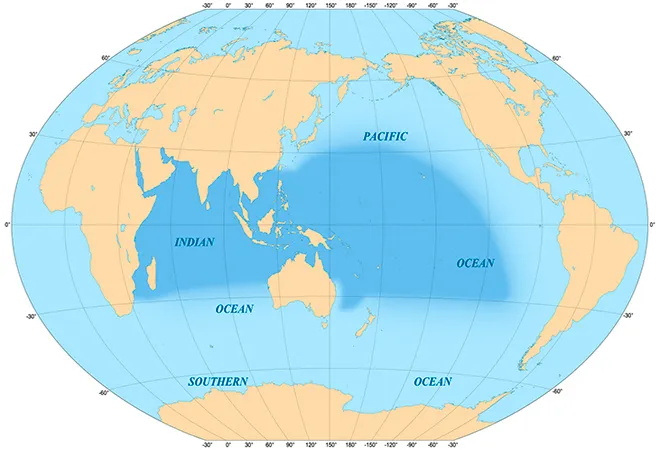-
CENTRES
Progammes & Centres
Location
The EU Indo-Pacific strategy signifies a shift in the EU’s perspective of the region from just economic to strategic
 The European Union (EU) is set to push for a closer relationship and stronger presence in the Indo-Pacific, as released in the EU Strategy for Cooperation in the Indo-Pacific. The European Commission President, Ursula von der Leyen, said, “If Europe is to become a more active global player, it also needs to focus on the next generation of partnerships.” Besides the Indo-Pacific strategy, the EU is also looking to launch the “Global Gateway” as a scheme to compete with China’s Belt and Road Initiative (BRI). The EU seems determined to grow on its existing relationships and partnerships in the Indo-Pacific region and further cement these ties to finally emerge as a political, economic and security actor in the region.
The European Union (EU) is set to push for a closer relationship and stronger presence in the Indo-Pacific, as released in the EU Strategy for Cooperation in the Indo-Pacific. The European Commission President, Ursula von der Leyen, said, “If Europe is to become a more active global player, it also needs to focus on the next generation of partnerships.” Besides the Indo-Pacific strategy, the EU is also looking to launch the “Global Gateway” as a scheme to compete with China’s Belt and Road Initiative (BRI). The EU seems determined to grow on its existing relationships and partnerships in the Indo-Pacific region and further cement these ties to finally emerge as a political, economic and security actor in the region.
The EU has just been present as an economic actor in Asia and the broader Indo-Pacific. The strategic and political developments in this region did not fall in its immediate radar.For long, the EU has just been present as an economic actor in Asia and the broader Indo-Pacific. The strategic and political developments in this region did not fall in its immediate radar. Until last year, the EU had not engaged with the idea of the Indo-Pacific and neither did it define its policy priorities for the region. The reason for this hesitance was that, given the strong economic relationship of some member states of the EU with China, the Union feared that doing so would indicate alignment with the US and would alienate China. Recently, members like Germany, France, and the Netherlands have all started embracing the notion of the Indo-Pacific and are also integrating the Indo-Pacific in their own national security strategies. Therefore, these EU member states have been the driving force behind pushing Brussels to adopt the Indo-Pacific as a strategic concept.
The EU is feeling the need to play a bigger role in Asia, to bear greater responsibility and to have an impact on the affairs of this region, whose fate is intertwined with that of Europe.Besides the above-mentioned factors, there are other imminent issues which the Indo-Pacific region faces that can have an impact on the European countries’ own security interests too, like the potential risks of emerging technologies, ensuring supply chain resilience, and countering disinformation. Europe, as mentioned above, for decades, has just shouldered the responsibility of being present as an economic actor in Asia, a region considered far away, but there is also a growing sense that the tide of international politics has shifted to Asia in general, and the Indo-Pacific in particular, with the economic rise of countries like India, China, Singapore, Vietnam, and Indonesia among others. The EU is feeling the need to play a bigger role in Asia, to bear greater responsibility and to have an impact on the affairs of this region, whose fate is intertwined with that of Europe. Given Europe has mostly engaged with this region in the trading realm, security of the Sea Lanes of Communication (SLOCs) and the safe passage of commercial vessels is an important concern for the EU. Given China’s expansionist tendencies in the Western Pacific and its growing footprints in the Indian Ocean, it is only logical for the EU to think of working alongside other like-minded countries in the Indo-Pacific region like India, Japan, Australia, and the US in the maritime domain.
Eleven member states see the adoption of an EU Indo-Pacific strategy as “an assertion of European strategic autonomy”, i.e., Europe “striking out on its own, without the need for the US to support it”.There are also varying opinions on the type of partnership that is to be maintained with the US with regard to the Indo-Pacific. Eleven member states see the adoption of an EU Indo-Pacific strategy as “an assertion of European strategic autonomy”, i.e., Europe “striking out on its own, without the need for the US to support it”. Eight member states regard it as a way of managing the transatlantic alliance—potentially keeping the US engaged as Washington’s focus has always been more on the Pacific, rather than on Europe. To six countries, the launch of an EU Indo-Pacific strategy is part of an explicit effort to align with the US and lend support to it. This differing stand brings forth the question of whether the EU will perceive the Indo-Pacific from an economic or a strategic vantage point in this strategy.
The EU is seeking new digital partnerships with Japan, South Korea and Singapore, which would enhance cooperation and interoperability on emerging technologies like Artificial Intelligence.There is a willingness to work with Quad partner countries, especially on climate change, technology and vaccines. Besides the platform of the Quad, given how the India-EU relations have been developing notably after the India-EU summit, there is mention of how this India-EU relationship can be given a further push, especially the EU-India digital partnership. The EU-ASEAN relations have also been on a high with the EU recently being given the status of a dialogue partner in the sub-regional organisation. Belief in ASEAN Centrality and how there is a need for further enhancing of the EU-ASEAN partnership, such as supporting the ASEAN Digital Masterplan 2025, has found a mention. The EU has been really keen on forging closer relations in a third region with the help of countries like India and Japan that are, ASEAN, Africa, and South Pacific in areas like connectivity.
The views expressed above belong to the author(s). ORF research and analyses now available on Telegram! Click here to access our curated content — blogs, longforms and interviews.

Premesha Saha is a Fellow with ORF’s Strategic Studies Programme. Her research focuses on Southeast Asia, East Asia, Oceania and the emerging dynamics of the ...
Read More +